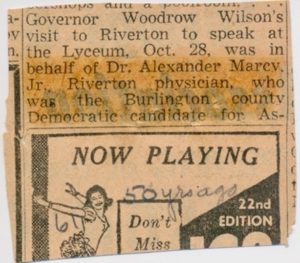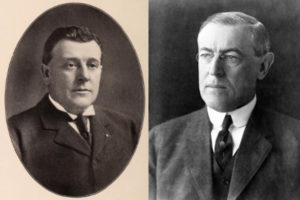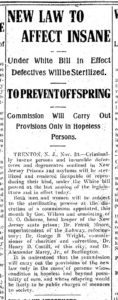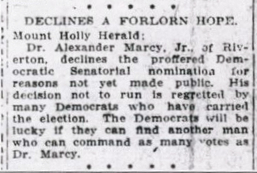Ugly
Patricia Smith Solin
Archives of the Historical Society of Riverton
Sometimes you find an ugly surprise when you do research. Sometimes you find an ugly surprise when you do research. This recent descent “down the rabbit hole” led to a shocking discovery about one of Riverton’s most esteemed residents.
I’ve been helping to catalog the archives of the Historical Society of Riverton. As a former librarian, I enjoy volunteering and using my training to assist in their project.

Recently I began cataloging the documents and photos for Riverton’s Lyceum, a meeting hall for dances, lectures, and social functions.
Keith Betten, the HSR’s lead archivist, offered me the box of materials since I had written an article for the September 2011 Gaslight News on this unique building that hosted dances, concerts, plays, public meetings, and other such events from 1886 until 1918.

Among other materials in the archive’s box, I found a small newspaper clipping (unknown source) that noted that the former owner of my house, Dr. Alexander Marcy, Jr hosted a guest speaker on October 28th at the Lyceum on his behalf – New Jersey Governor Woodrow Wilson. The penciled note suggests that it was clipped from a newspaper in 1961 from a section called 50 Years Ago. I checked further on the details of this meeting.
Dr. Alexander Marcy, Jr. and New Jersey Governor, Woodrow Wilson
Wilson was governor in 1911, so the time fit. I did not know that Marcy was a Democrat in this very-Republican town!
What was the connection between Wilson and Marcy?

And Woodrow Wilson, 1910. Wilson image courtesy Wikipedia
Dr. Alexander Marcy enjoyed a long and respected career as a beloved physician in Riverton. A Mason and a trustee of Calvary Presbyterian Church, the good doctor pursued new methodologies for improving the lives of his patients and authored many medical articles. In 1899, he helped establish the Riverton Library and Free Reading Room at Christ Church, the predecessor of Riverton Free Library. His 1934 obituary stated he was an organizer and later president of Cinnaminson National Bank in Riverton and served as president of the New Jersey Medical Society in 1906. Marcy’s son-in-law, J. Gardner Crowell, guessed that the famed late obstetrician had brought “at least half of Riverton” into this world.
Altogether he was a valued and respected community member.
However…
Eugenics
In 1910, as a part of New Jersey’s Social Service, Dr. Marcy chaired a New Jersey Sanitary Association committee on the Study and Prevention of the Social Evil, which had plans to form a permanent organization.
One year later, Wilson named Marcy to a board of examiners. Its mandate was to ascertain if someone who was mentally or physically disabled or a habitual criminal convicted of sexual assault should undergo sterilization.
As noted on page 89 of the Legal, Legislative and Administrative Aspects of Sterilization, his uncle/father-in-law, Dr. Alexander Marcy, Sr, also endorsed the proposal.
This relationship bears an explanation. Marcy, Jr married his first cousin. Further, the cousin’s father is the man after whom our Dr. Marcy was named, not his own father, so he actually isn’t a “Jr.”

The New Jersey Legislature passed on 21 April 1911, “An act to authorize and provide for the sterilization of feebleminded (including idiots, imbeciles and morons), epileptics, rapists, certain criminals and other defectives.”
Although the state of New Jersey was one of the first to codify this kind of sterilization legislation, there is a long and incremental history since the mid-1800s of what are deemed “ugly laws” taking shape throughout the country. Such laws were mostly municipal statutes in the United States that targeted those who had visible disabilities, poor people, vagrants, and public beggars.
According to Steven A. Farber in his U.S. Scientists’ Role in the Eugenics Movement (1907-1939): A Contemporary Biologist’s Perspective:
…many intellectuals and political leaders (e.g., Alexander Graham Bell, Winston Churchill, John Maynard Keynes, and Woodrow Wilson) accepted the notion that modern societies, as a matter of policy, should promote the improvement of the human race through various forms of governmental intervention. While initially this desire was manifested as the promotion of selective breeding, it ultimately contributed to the intellectual underpinnings of state-sponsored discrimination, forced sterilization, and genocide.
The eugenics movement misguidedly sought to arrange reproduction within a human population to increase the occurrence of heritable characteristics regarded as desirable. Since discredited, Nazis adopted the idea of preventing “undesirables” from procreating during World War II to kill millions of people who did not conform to the political, religious, ethnic, or sexual criteria of the Nazis.
Thankfully, the legislation no sooner passed, and it came under legal challenge. In the case of Smith v. Board of Examiners, the New Jersey Supreme Court deemed the law unconstitutional, and the State of NJ repealed the law in 1913. It did not result in any recorded sterilizations.

Marcy, Runs for NJ Assembly as a Democrat
Later that same year, in October 1911, Marcy ran for NJ Assembly as a Democrat, with the endorsement of his personal friend, Democratic Governor Woodrow Wilson.
According to the Perth Amboy Evening News, 26 Oct 1911 (p. 4), “Local Option Causes Stir in Burlington,” Marcy hoped that the endorsement of the Anti-Saloon League would encourage cross-over votes from Republicans, winning him the seat. For years, Marcy had held strong views about the discontinuance of alcohol, both as a medicine and a beverage.
Dr. Marcy lost to the incumbent Republican Assemblyman Blanchard H. White in November 1911.
By July 1912, the Democratic County Executive Committee urged Marcy to run for the NJ Senate.
Was the second time to be the charm for Marcy’s political ambitions?

According to The Morning Post (Camden), on August 6, 1912 (page 5), Marcy, without reason, withdrew his name from the upcoming November election.
As for Wilson, he moved on from New Jersey, taking the oath of office as the 28th President of the United States on 4 March 1913. There, as history.com, pbs.org, and others acknowledge, the segregationist continued to embrace eugenics and perpetuated inequality for Black Americans.
Disconcerting? Disappointing?
Yes, but we can’t turn our heads and pretend awful things didn’t happen in our town. Riverton’s history is often more complicated than it appears on the surface.
Everyone, then and now, is a mess of contradictions, especially when we judge the past through the lens of today’s moral standards.
References:
Farber, S. A. U.S. Scientists’ Role in the Eugenics Movement (1907-1939): A Biologist’s Perspective. Retrieved July 30, 2022 from https://www.ncbi.nlm.nih.gov/pmc/articles/PMC2757926/
Kersten, L. (2014, March 13). New Jersey passed a sexual sterilization law, only to have it be deemed unconstitutional in 1913. No eugenics legislation was carried through. Retrieved July 22, 2022, from https://eugenicsarchive.ca/discover/timeline/5321ae38132156674b000231
“Declines a Forlorn Hope.” The Morning Post (Camden, NJ) 06 Aug 1912, p. 6.
Laughlin, Harry H. “Eugenical Sterilization in the United States: Legislative Record of the Sterilization Laws” Cold Springs Harbor. 1 Jan 1922.
Laughlin, Harry H. “The Legal, Legislative and Administrative Aspects of Sterilization.” Eugenics Ethics Office. Bulletin 10B. Cold Spring Harbor, Feb. 1914.
“Local Option Causes Stir in Burlington.” Perth Amboy Evening News (NJ), 26 Oct. 1911, p. 4.
Journal of the Executive Sessions, New Jersey Legislative Senate. 6 Feb. 1912, p. 1330.
Portrait of Alexander Marcy Jr., Journal of the Medical Society of New Jersey. 1906
Proceedings of the New Jersey Sanitary Association. 36th Annual Meeting. 1910. p. 29.
Wilson, S. (2015, February 5). Ugly Laws. Retrieved July 22, 2022, from https://eugenicsarchive.ca/discover/timeline/54d39e27f8a0ea4706000009

Well done Mrs. Solin!
I appreciate Roger’s suggestions to my draft, and especially rely on editor, John McCormick, who always checks my work and makes it even better. Thank you!
Thank you, Mrs. Solin, for this deeper dive into our home town. I can’t get enough of this historical education to provide broader context on matters of the times.